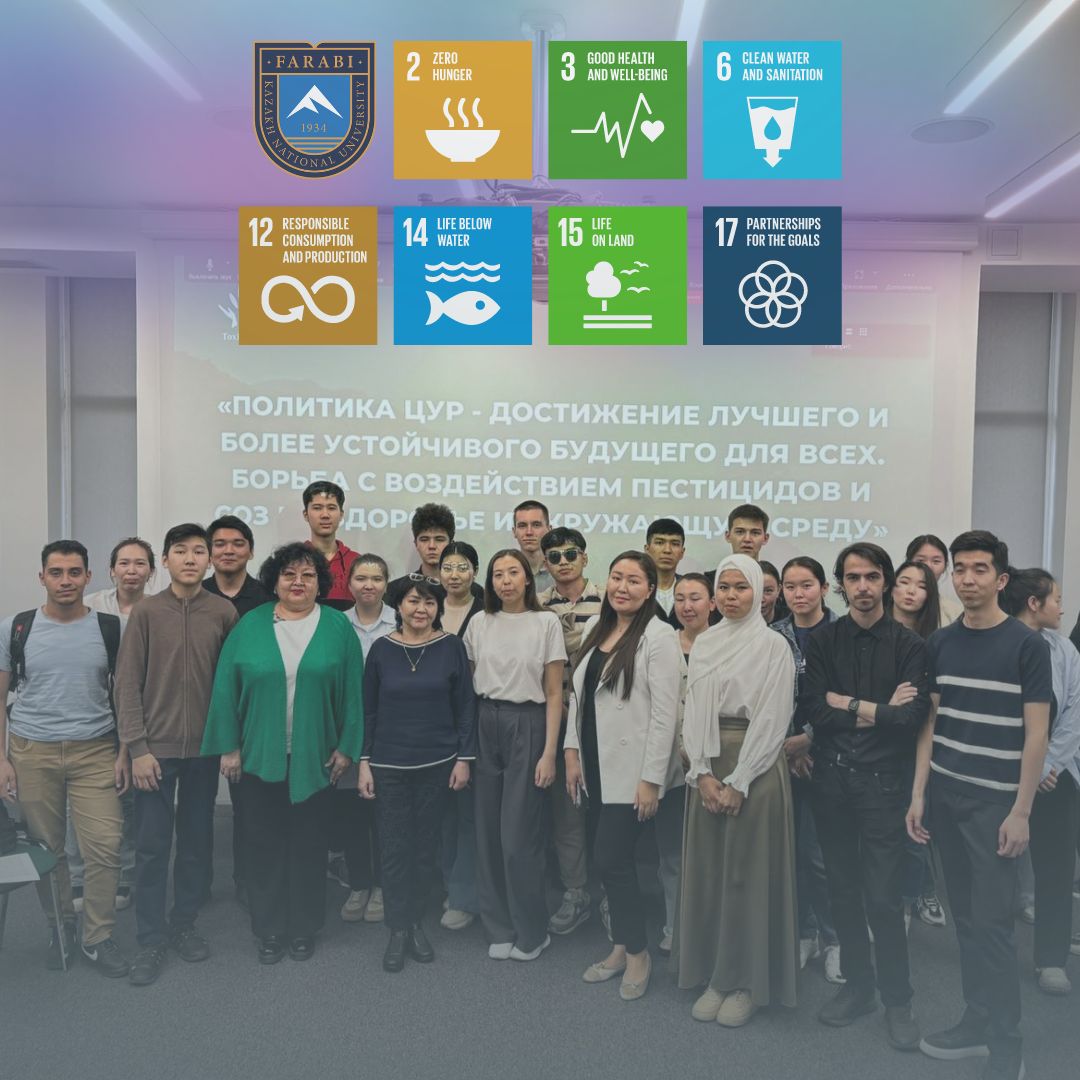- Main
- News
- The Department of Physical Chemistry, Catalysis and Petrochemistry organized an open lecture with the support of the ToxicNet network and the Center for Promotion of Sustainable Development: “The SDG policy is to achieve a better and more sustainable future for all. Combating the health and environmental impact of pesticides and POPs”.
The Department of Physical Chemistry, Catalysis and Petrochemistry organized an open lecture with the support of the ToxicNet network and the Center for Promotion of Sustainable Development: “The SDG policy is to achieve a better and more sustainable future for all. Combating the health and environmental impact of pesticides and POPs”.

As part of this event, guest speaker Aisulu Amantay (project coordinator of the RMS Center) highlighted important and pressing issues in the fight against obsolete pesticides and POPs (persistent organic pollutants), as well as the contribution this makes to achieving sustainable development goals: SDGs 2, 3 , 6, 12, 14, 15 and 17.
All those present were explained the concepts of “pesticides” (toxic chemicals that are used to control pests and plant diseases, as well as various parasites and carriers of dangerous diseases of humans and animals), “obsolete pesticides” (all pesticides whose technical characteristics expiration date/pesticides with unsatisfactory storage conditions/pesticides prohibited for use), “POPs” (a group of chemicals that are extremely resistant to natural decay).
Due to the fact that POPs and obsolete pesticides negatively affect the environment: they pollute soil, water resources, poison animals and all this has a long-term effect, the study and management of these substances and their waste is the current agenda.
The fight against POPs and pesticides makes a significant contribution to the implementation of the SDGs:
SDG 2: Climate action. The use of pesticides and other chemicals in agriculture can lead to greenhouse gas emissions and deterioration of soil quality, ultimately exacerbating climate change. Adopting sustainable agriculture practices such as organic farming and integrated pest management can reduce dependence on pesticides and reduce negative impacts on the climate.
SDG 3: Ensure health and well-being. The use of pesticides can have a negative impact on human health, causing poisoning, allergic reactions and other diseases. Regulating and reducing the use of hazardous pesticides improves air, water and soil quality, which in turn has a positive impact on public health.
SDG 6: Clean water and sanitation. The use of pesticides can lead to contamination of water resources such as rivers, lakes and groundwater. Controlling the use of pesticides and implementing sustainable agricultural practices help prevent water pollution and ensure access to clean water for people and ecosystems.
SDG 12: Responsible consumption and production. Reducing the use of pesticides and moving towards more sustainable farming practices helps reduce waste and the environmental footprint of agricultural production, consistent with the principles of responsible consumption and production.
SDG 14: Living ecosystems. Pesticide use can negatively impact biodiversity and ecosystem vitality, including the destruction of beneficial insects and plants. Adopting sustainable agricultural practices helps preserve biodiversity and healthy ecosystems.
SDG 15: Sustainable cities and communities. Adopting sustainable agricultural practices, such as the use of biodiverse crops and organic farming methods, helps ensure the sustainable development of rural and urban communities by reducing environmental pollution and increasing the availability of quality food.
SDG 17: Guest lecture on POPs and obsolete pesticides from an environmental company contributes to the implementation of SDG 17 (specifically 17.6 Increase cooperation and knowledge sharing in science, technology and innovation) through partnerships and knowledge exchange between the university and the private sector, and in the future - searching for innovative solutions to protect the environment.
The guest lecture was attended by more than 55 students, undergraduates and teachers from different universities (including West Kazakhstan Agricultural Technical University named after Zhəngir Khan, Almaty Technological University, Kazakh National Research Technical University named after K. I. Satpayev, Kazakh-British Technical University etc.).
The fight against POPs and pesticides is a key element in achieving many of the SDGs leading to more sustainable development at the global level!
Abdildina K.M.
Tashmukhambetova Zh.Kh.
